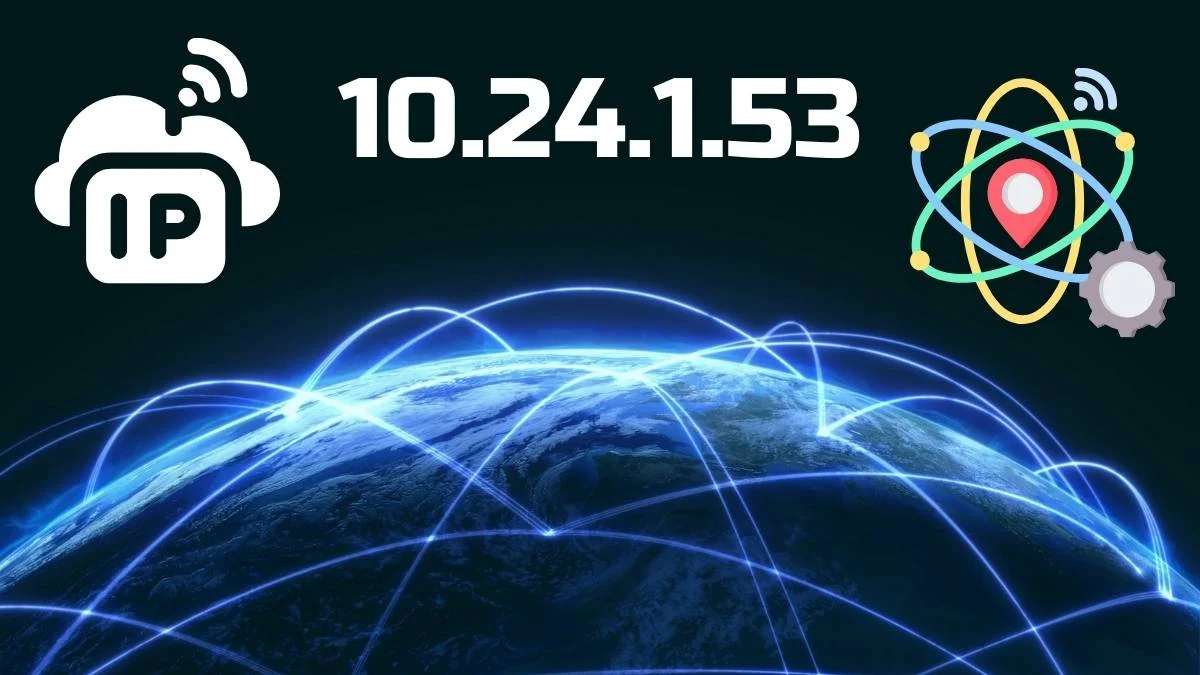The IP address “10.24.1.53” belongs to a private IP address range defined by the Internet Engineering Task Force (IETF) for internal network use. Specifically, it falls within the 10.0.0.0 – 10.255.255.255 block, which is one of the reserved IP ranges for private networks as specified in RFC 1918. Understanding the significance of this IP address is important for network administrators and individuals interested in network configurations.
What is a Private IP Address?
A private IP address is an address used for communication within a local network. These IPs are not routable on the internet and are generally used by devices that are connected to a router or a firewall that manages external connections. The private address ranges defined by RFC 1918 are commonly used in homes, businesses, and data centers for managing internal communications securely without occupying public IP addresses.
The 10.0.0.0/8 Address Block
The 10.0.0.0/8 address block is one of the largest private address ranges, offering over 16 million possible addresses. This makes it a popular choice for organizations that require a large internal network setup, such as enterprises, cloud service providers, and large-scale networking projects.
Use Cases for 10.24.1.53
- Local Network Setup: The IP “10.24.1.53” can be assigned to a device within a local network, such as a computer, server, or network printer. The use of a private IP ensures that this device can communicate internally without being exposed to the public internet.
- Internal Web Servers: Companies often use private IP addresses like “10.24.1.53” to host internal web servers or intranet portals. This allows employees to access company resources without exposing sensitive information to external threats.
- Network Configuration: In enterprise settings, network administrators may configure subnets within the 10.0.0.0/8 range to optimize performance or segregate different departments. “10.24.1.53” could represent a specific subnet or device that is part of this structure.
- Private VPNs: A Virtual Private Network (VPN) might use the 10.0.0.0/8 range to create secure tunnels between remote users and the corporate network. The device with the IP “10.24.1.53” could be a VPN gateway that ensures encrypted communication.
Security Considerations
Even though 10.24.1.53 is a private IP address, network security remains crucial. Devices using this IP should be protected by firewalls, proper encryption, and strong authentication mechanisms to prevent unauthorized access. Moreover, if any device within the internal network requires external access, a network address translation (NAT) device will typically map the private IP to a public IP address for communication with the internet.
Advanced Applications of 10.24.1.53
Beyond basic networking and security, there are several advanced applications for private IP addresses like “10.24.1.53” in modern IT infrastructures:
1. IoT Device Integration
With the growing number of Internet of Things (IoT) devices being deployed in businesses and homes, private IP addresses are essential for managing these devices securely. For instance, a company might use “10.24.1.53” to assign an IP address to a smart thermostat, security camera, or sensor in a building automation system. By using private IP addresses, these devices can communicate with each other without exposing their activities to the outside world.
2. Cloud Networking
As more businesses migrate to cloud computing, private IP addresses are often used in cloud-based virtual networks. Cloud service providers like AWS, Microsoft Azure, and Google Cloud allow customers to create virtual private clouds (VPCs), where private IPs from ranges like 10.0.0.0/8 are assigned to cloud instances. “10.24.1.53” could represent a virtual machine, storage device, or database within such a network. This enables enterprises to have a secure, isolated environment within the cloud while still maintaining the ability to scale.
3. Network Segmentation
In larger networks, subnetting is a technique used to divide a larger network into smaller, more manageable segments. By applying subnetting, administrators can create multiple subnets within the 10.0.0.0/8 range. For example, “10.24.1.53” could be part of a subnet dedicated to a specific department, like accounting or IT support. This segmentation helps improve performance and security by isolating network traffic and controlling access to sensitive resources.
4. Virtualization and Containers
The rise of server virtualization and containerized applications means that private IP addresses are increasingly important for managing virtual machines (VMs) and containers. Virtual environments, whether on-premises or in the cloud, require their own internal IP addresses for communication. An IP like “10.24.1.53” could be assigned to a VM or container running on a hypervisor or container orchestration platform like Kubernetes, ensuring that these instances can communicate efficiently within the virtualized environment.
5. Private DNS Setup
For large organizations, setting up a private Domain Name System (DNS) server is a common practice. By using a DNS server that operates within the private network, devices can resolve domain names to internal IP addresses rather than relying on external DNS providers. “10.24.1.53” could serve as a DNS server within a private network, ensuring fast and secure domain name resolution for devices communicating on the internal network.
Best Practices for Managing IP Addressing
 To maximize the effectiveness of private IP addresses like 10.24.1.53, network administrators should follow several best practices:
To maximize the effectiveness of private IP addresses like 10.24.1.53, network administrators should follow several best practices:
- Proper Subnetting: Divide the private IP address space into appropriate subnets based on the organization’s size, geography, and requirements. This helps optimize performance and simplifies network management.
- Address Planning: Maintain a clear and consistent IP addressing scheme. Assign static IP addresses to critical devices and use dynamic IP address assignment (DHCP) for less critical devices. This ensures that network devices are easy to locate and manage.
- Network Monitoring: Regularly monitor network traffic to detect any unauthorized access attempts or abnormal traffic patterns. Even though “10.24.1.53” is a private IP, it is still vulnerable to attacks if proper security measures are not in place.
- Segregating Sensitive Data: Use private IP addresses to isolate sensitive data from less secure parts of the network. For example, servers that store customer data can be placed in a subnet with restricted access, while other devices on the network can use different subnets.
- NAT and Port Forwarding: If external access to a device with a private IP is required, network address translation (NAT) and port forwarding can be used. This allows a device with a private IP like “10.24.1.53” to communicate with the outside world securely by mapping its internal address to a public IP address.
Future Trends
As networking technology continues to evolve, the role of private IP addresses like “10.24.1.53” will only become more important. Some key trends to watch for include:
- IPv6 Adoption: While IPv4 addresses like “10.24.1.53” are still widely used, the adoption of IPv6 addresses will eventually impact private IP addressing strategies. IPv6 provides a vastly larger address space, which could offer new ways to address devices in private networks.
- SD-WAN and Network Automation: The rise of Software-Defined Wide Area Networks (SD-WAN) and network automation will make it easier for businesses to manage complex network configurations. In these environments, private IP addresses will continue to be pivotal for secure and efficient traffic routing.
- Zero Trust Security Models: The increasing adoption of Zero Trust security models, where access to resources is strictly controlled based on user identity and device health, will also drive the importance of private IP addressing. Devices assigned IPs like “10.24.1.53” will be subject to more stringent security policies to ensure only trusted traffic is allowed.
Conclusion
The IP address 10.24.1.53 is part of a much larger ecosystem of private IP addresses used to ensure secure, efficient, and scalable network configurations. Whether used for local communication, cloud networking, IoT device management, or network segmentation, it plays a crucial role in today’s interconnected world. By following best practices for IP address management and keeping up with emerging trends, businesses and individuals can optimize their networks for performance and security.
You May Also Read: Rs 119 only wireless earbuds for gaming & music bluetooth earbuds thesparkshop.in














Leave a Reply